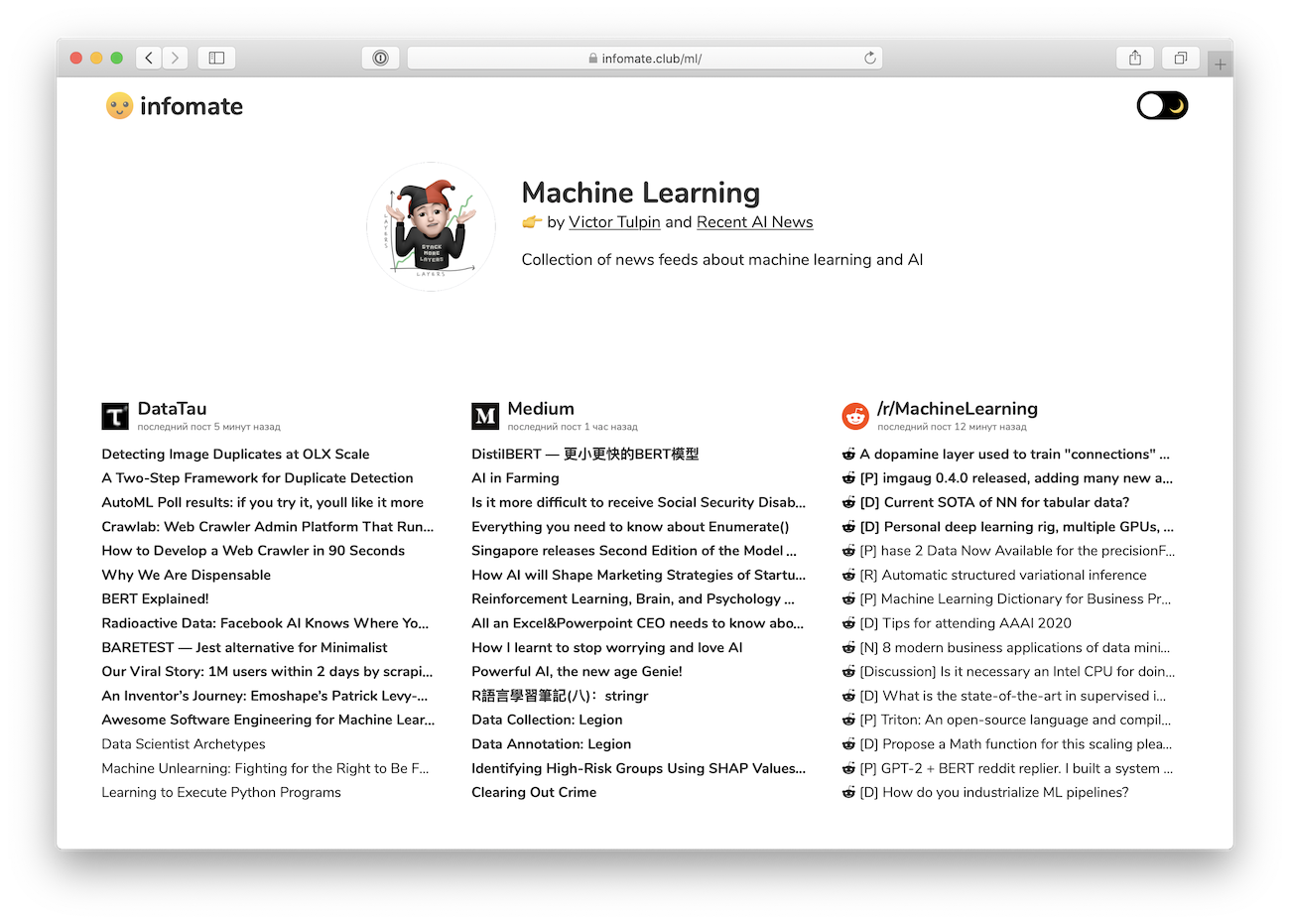Infomate is a small web service that shows multiple RSS sources on one page and performs tricky parsing and summarizing articles using TextRank algorithm.
It helps to keep track of news from different areas without subscribing to hundreds of media accounts and getting annoying notifications.
Thematic and people-based collections does a really good job for discovery of new sources of information. Since we all are biased, such compilations can really help us to get out of information bubbles.
Live URL: infomate.club
Which means you really shouldn't expect much from it. I wrote the MVP over the weekend to solve my own pain. No state-of-art kubernetes bullshit, no architecture patterns, even no tests at all. It's here just to show people what a pet-project might look like.
This code has been written for fun, not for business. There is usually a big difference.
It's basically a Django web app with a bunch of scripts for RSS parsing. It stores the parsed data in a PostgreSQL database.
The web app is only used to show the data (with heavy caching). Parsing and feed updates are performed by the three scripts running in cron. Like poor people do.
Feedparser and BeautifulSoup are used to find, download and parse RSS.
Text summarization is done via newspaper3k with some additional protection against bad types of content like podcasts and too big pages in general, which can eat all your memory. Anything can happen in the RSS world :)
The easy way. Install docker on your machine. Then:
git clone [email protected]:vas3k/infomate.club.git
cd infomate.club
docker-compose up --build
On the first run you might need to wait until the "migrate_and_init" container will finish its job populating your database. After that you can open localhost:8000 in your favorite browser and enjoy.
If something stucked or you want to terminate it completely, use this command in another terminal:
docker-compose down --remove-orphansAll collections and feeds are stored in one file — boards.yml. This is your main and only entry point to add new stuff.
boards:
- name: Tech # board title
slug: tech # board url
is_visible: true # visibility on the main page
is_private: false # private boards require logging in
curator: # board author profile
name: John Wick
title: Main news
avatar: https://i.vas3k.ru/fhr.png
bio: Major technology media in English and Russian
footer: >
this is a general selection of popular technology media.
The page is updated once per hour.
blocks: # list of logical feed blocks
- name: English # block title
slug: en # unique board id
feeds:
- name: Hacker News
url: https://news.ycombinator.com
rss: https://news.ycombinator.com/rss
- name: dev.to
url: https://dev.to
rss: https://dev.to/feed
- name: TechCrunch
rss: http://feeds.feedburner.com/TechCrunch/
url: https://techcrunch.com
is_parsable: false # do not try to parse pages, show RSS content only
conditions:
- type: not_in
field: title
word: Trump # exclude articles with a word "Trump" in title
Deployment is done using a simple Github Action which builds a docker container, puts it into Github Registry, logs into your server via SSH and pulls it. The pipeline is triggered on every push to master branch. If you want to set up your own fork, please add these constants to your repo SECRETS:
APP_HOST — e.g. "https://your.host.com"
GHCR_TOKEN — your personal guthib access token with permissions to read/write into Github Registry
SECRET_KEY — random string for django stuff (not really used)
SENTRY_DSN — if you want to use Sentry
PRODUCTION_SSH_HOST — hostname or IP of your server
PRODUCTION_SSH_USERNAME — user which can deploy to your server
PRODUCTION_SSH_KEY — private key for this user
After you install them all and commit something to the master, the action should run and deploy it to your server on port 8816.
Don't forget to set up nginx as a proxy for that app (add SSL and everything else in there). Here's example config for that: etc/nginx/infomate.club.conf
If something doesn't work, check the action itself: .github/workflows/deploy.yml
Pull requests are welcome. For major changes, please open an issue first to discuss what you would like to change.
You can help us with opened issues too. There's always something to work on.
We don't have any strict rules on formatting, just explain your motivation and the changes you've made to the PR description so that others understand what's going on.
Apache 2.0 © Vasily Zubarev
TL;DR: you can modify, distribute and use it commercially, but you MUST reference the original author or give a link to service
